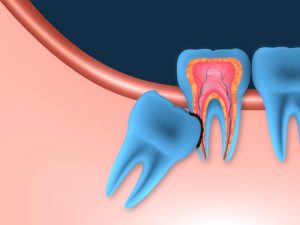 By the time you reach your teenage years, your baby teeth should be gone, and your permanent teeth should be in place. However, there may still be one set of teeth left to emerge: your wisdom teeth.
By the time you reach your teenage years, your baby teeth should be gone, and your permanent teeth should be in place. However, there may still be one set of teeth left to emerge: your wisdom teeth.
Most people develop wisdom teeth in their late teens or early 20s, though some people never get wisdom teeth at all. More often than not, dentists recommend having your wisdom teeth extracted just as they are beginning to emerge. Leaving your wisdom teeth in place may result in some unwanted consequences.
What Problems Can Emerge When I Leave My Wisdom Teeth?
The big problem with wisdom teeth is that the jawbone is typically not large enough to accommodate them. Since there is not enough space for the wisdom teeth to emerge comfortably, they tend to interfere with the surrounding teeth. This lack of space will potentially push the adjacent teeth out of place and cause crowding or alignment issues. Additionally, without the space they need to emerge, wisdom teeth may remain “impacted,” which means they are partially or completely submerged in gum tissue. Impacted wisdom teeth are difficult to clean, which can result in problems such as infection.
Consequences of Leaving Your Wisdom Teeth in Place
Some of the specific problems that your wisdom teeth can cause include:
- Jaw and facial pain. As the wisdom teeth erupt or shift, they can trigger pressure and pain along the side of your face, behind the other teeth, or even in your ears.
- Infection. Impacted wisdom teeth are magnets for bacterial buildup. Because they are so hard to clean, it is very difficult to control bacteria. This leaves the bacteria free to spread, causing infection not just in your gums but throughout your whole body.
- Tooth decay. When an oral infection is untreated, it can spread throughout the mouth, causing multiple teeth to decay.
- Cysts. If wisdom teeth try to erupt but do not have the space to do so, they may form tiny, fluid-filled sacs. Not only are these sacs painful, but they can cause damage to the surrounding teeth and even to your jawbone.
- Crowding. When there is insufficient room in the jaw, the wisdom teeth can erupt at an odd angle, potentially pushing the surrounding teeth and causing them to shift position. Over time, your beautiful, healthy smile may become filled with crooked, overlapping, or unevenly spaced teeth.
- Abnormal bite. If wisdom teeth come in at an unusual angle, they can prevent your top teeth and bottom teeth from aligning properly. This can alter your bite and put undue stress on your entire jaw.
How Do I Know When I Need to Have My Wisdom Teeth Removed?
Your wisdom teeth may not cause these problems right away, but it may still be best to have them removed to prevent issues down the road. The question is, how can you determine when it is time for your wisdom teeth to come out?
The best thing you can do is stay current with routine dental checkups. Your dentist will monitor the progression of your wisdom teeth and let you know when it is time to schedule an appointment with an oral surgeon.
Additionally, we recommend scheduling an oral surgery appointment if you experience any of the following symptoms:
- Swelling of the face and gums
- Pain in your teeth or the side of your face
- Bad breath
- Gum disease
- Cysts forming around your teeth and gums
These are some of the telltale signs that your wisdom teeth are causing problems and need to be removed as urgently as possible.
Does Everyone Need to Have Their Wisdom Teeth Removed?
The majority of people need to have their wisdom teeth removed sooner or later.
Though somewhat rare, there are some people who never get wisdom teeth at all. And there are also some cases where the wisdom teeth grow in straight, erupt through the gums normally, and do not cause any issues with the surrounding teeth. In these instances, your dentist might recommend keeping the wisdom teeth in place.
These scenarios are exceptions to the rule, and for most people, wisdom teeth removal is an important way to avoid any long-term dental complications.
Schedule a Wisdom Teeth Removal Appointment
Ready to discuss wisdom teeth removal? If you live in Naperville, IL, we invite you to schedule an appointment with one of our doctors. Contact Oral and Facial Surgery of Naperville whenever you are ready to discuss treatment options.







